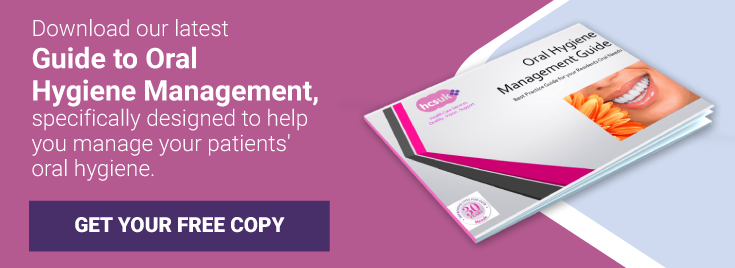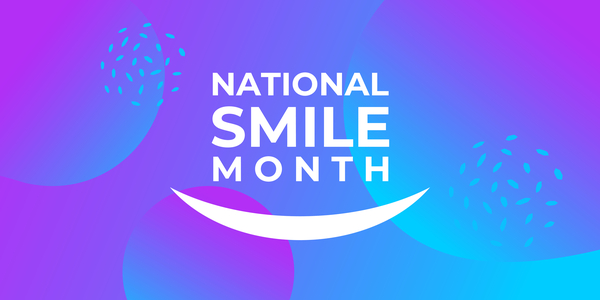How improving oral hygiene can help to reduce the spread of COVID-19
As part of National Smile Month which aims to help us achieve good physical and mental well-being by promoting and improving oral health, we wanted to highlight just how important good oral care is right now and how it can help to reduce the risk of the spread of COVID-19.
We know that in most cases, COVID-19 infection is spread via respiratory droplets such as coughing and sneezing and as these droplets are derived from saliva, the effect of lowering levels of bacteria and viruses in the mouth through toothbrushing and regular cleaning of dentures can only help to reduce the number of viral particles present in the atmosphere.
In addition to these measures, regular rinsing with mouthwashes that contain 1% Hydrogen Peroxide have been demonstrated to be effective against COVID-19.
Therefore supporting mouthcare for residents who are unwell with COVID-19, or symptoms, is not only an important part of their overall patient care, but can also reduce the spread of the infection to others.
Here at Hcsuk, we have set out the latest best practice guidance on oral care for residents with COVID-19 or suspected COVID-19, from Public Health England and guide you through our fit for purpose oral care product range helping you to give your residents the best possible mouthcare to improve their health and wellbeing.
If oral hygiene is neglected, residents’ mouths will rapidly become dry and sore. The aim of good mouthcare is to maintain oral cleanliness, prevent additional infection and reduce the likelihood of developing bacterial pneumonia.
On admission, it is important to include an oral assessment for each resident in their care plan.
When providing mouthcare for residents with COVID-19 staff must wear personal protective equipment (PPE) to prevent contact and droplet transmission. This means wearing disposable gloves, plastic apron, eye protection and a fluid resistant face mask. Delivering mouthcare is not an aerosol generating procedure. However, the environment you are working in may require the use of enhanced PPE (e.g. if working where patients are ventilated.)
Two additional really useful tools to have handy when delivering oral care are a pen torch to enable you to see properly what is happening inside your resident’s mouth (which can be a dark place) and also a Bedi Shield designed to help facilitate oral care with dignity and in a safe, efficient and unobtrusive manner.

Mouthcare for non-ventilated residents
• if residents are having oxygen via a face mask, check with the nurse in charge before removing this for the time needed to carry out mouthcare
• assess your resident and consider if they can brush their own teeth, or if you need to help them to keep their mouth moist and clean
• these residents are more likely to cough when performing mouth care, be gentle, stand to the side or behind them, take breaks to allow the patient to rest and swallow
• if possible, sit your resident upright
• if your resident has a dry mouth, encourage sips of fluid (unless nil by mouth), hydrate with a toothbrush or an oral swab dipped in water or apply available dry mouth gel to their tongue, inside of their cheeks and roof of their mouth using an oral cleanser
• make sure your resident’s lips are kept moist with a nourishing lip balm particularly before cleaning
• if your resident can brush their own teeth give them a soft, small headed toothbrush with a smear of non-foaming toothpaste
• do not use an electric toothbrush as this may cause droplets and splash
• if your resident can spit, give them a disposable bowl to spit into
• if your resident is unable to spit and bedside suction is available, and you are trained to use it, then use gentle oral suctioning to remove excess saliva and toothpaste
• after brushing rinse their brush, and store with their toothpaste in a sealed named container
• if a resident has false teeth (dentures) encourage them to remove these after meals to clean off debris with a toothbrush. Remove dentures at night and store dry, in a named denture pot.
• residents may not wish to wear dentures when unwell and it is important that they are stored in a named denture pot to avoid them getting lost
• if eating, encourage residents to have a few sips of water after meals to clear any left-over food from their mouth
• if a resident is confused, refuses, or resists care, stop and try again later, remembering to record any non-compliance in their care plan.
To try and help make life easier for you during what must be both an incredibly busy and stressful time for care managers we have put together a COVID-19 Complete Oral Care Solution Pack which contains everything you need, as described above to deliver effective oral care for your residents with COVID-19, or suspected COVID-19 in one hygienic and reusable plastic box.
This guidance outlines mouthcare for adults and children with COVID-19 or suspected COVID-19 who are non-ventilated and those having step down or end of life care.
If you would like any further information, assistance or samples of any of our oral care products included in this article, then please don’t hesitate to contact our Business Development Manager Jan Kelly on her mobile 07968 994660 or email her at jan@hcsuk.co.uk






